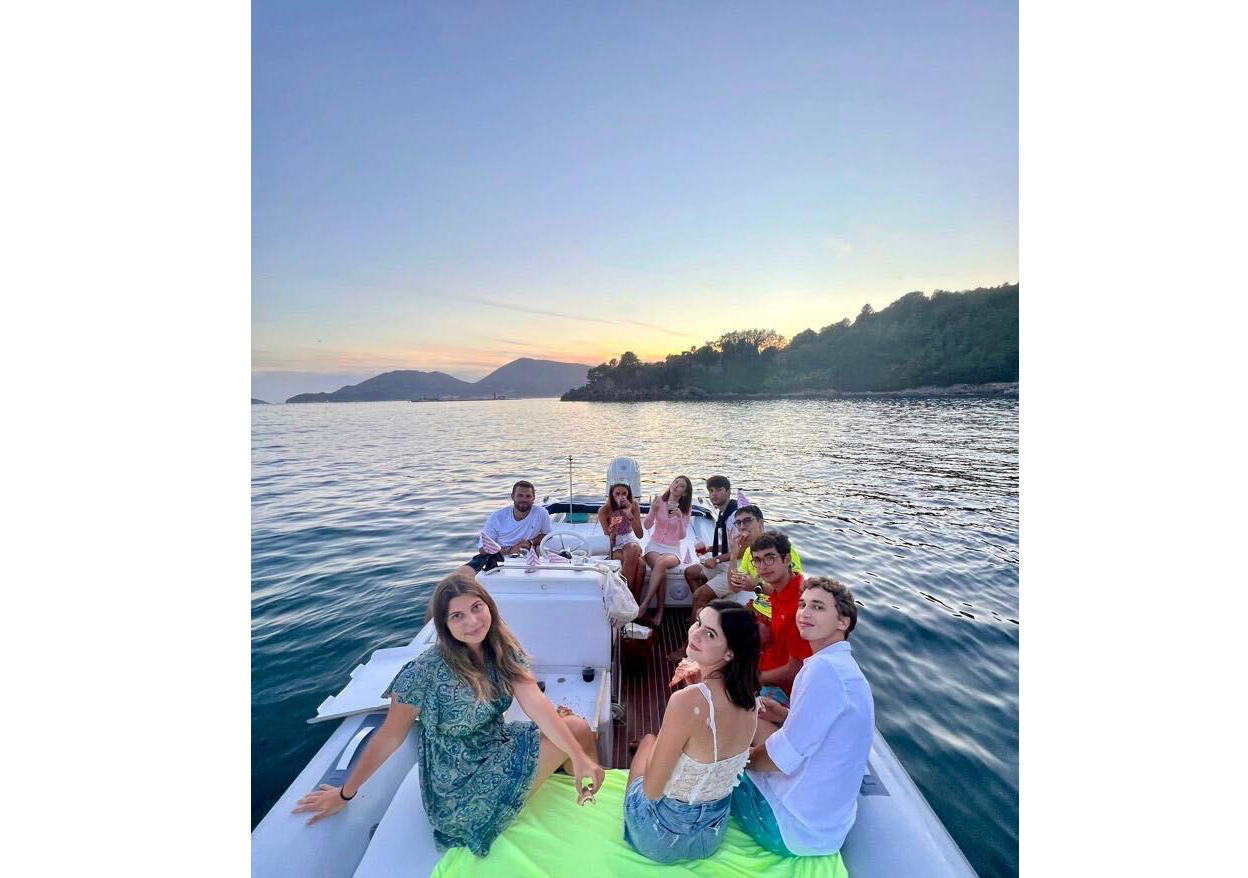Opinion: Finding my identity after moving to Italy for high school

Opinion columnist Chiara Grasso, alongside her friends, smiles for a photo on a boat in Italy. (Courtesy of Chiara Grasso)
By Chiara Grasso
April 4, 2023 8:52 p.m.
Airports have always fascinated me.
Traveling as much as my family did, I was always excited to experience everything from check-in and security to even waiting at the gate. I lived for it.
I was less excited when I had to leave Portland, Oregon, at age 15 to move to Lerici, Italy, a small harbor town in the Northwest region of the country. I felt anxious about what the future would hold.
When I arrived, I felt completely out of place. It felt strange that a language that previously only felt like it belonged to my mom, dad and siblings was also spoken by 60 million other people.
While I had grown up spending summers in Italy, living there full-time and attending school felt like I was entering an alternate reality.
Because of societal and cultural differences, I underwent a process of social and emotional growth to blend in. In order to do so, I remember walking through the halls of my high school on the first day and intently observing people – what they wore, how they carried themselves and what type of slang they used.
As I got acclimated to my new way of life in Italy, I also had to adapt academically. School was only a place to attend lectures from 8 a.m. to 1 p.m. with two 10-minute breaks and nothing else. All other forms of extracurricular activities and socialization took place outside of school.
Although losing some of the benefits of a campus-style school felt discomforting, it allowed me to explore the area where I lived on my own. By breaking out of my bubble, I had room to grow, which helped me become more independent and self-reliant.
It granted me the possibility to explore the person I wanted to become and how I wanted to be perceived.
In other ways, the transition felt smoother. Because we grew up speaking exclusively Italian at home, my siblings and I didn’t have American accents when speaking, which allowed us to blend in more easily. Being treated like everyone else made me feel more at ease and gave me the power to choose when to tell people that I wasn’t from Italy.
I would often watch people’s faces fill with surprise once I told them that I was American. I was usually met with: “No way! You’re American? Say something in American!”
At that point, I would say something like, “I don’t really know what to say,” with an awkward laugh. It warmed my heart when people were excited and curious about where I had lived. It made me feel welcome to share that part of myself with them.
Depending on who I was talking to, people assumed I was more Italian than American or vice versa. I felt as though I was living a double life, and fighting this feeling led me to believe the people around me were right – that I was more one nationality than the other. When I was in Italy, I got more used to speaking Italian and felt more comfortable calling myself Italian. Meanwhile, in the U.S., I felt more American.
At the same time, I was confronted with differences in mentality in both countries that made me feel culturally divergent.
When I was little, I was in a sailing program in Lerici, and my peers would ask me how far away Portland was from the ocean. I confidently noted that it was “very close, only a two to three hour drive,” after which I was confused as to why people started laughing. I later learned that a few-hour drive is a long way away by Italian standards.
Another time, at a public pool in Portland, I was confused when my six-year-old friend was banned access because of not bringing a swimsuit top with her. In Italy, girls under 10 aren’t obligated to wear any sort of swimsuit top since most girls have yet to undergo puberty. And even then, many beaches allow women to bathe topless – something that is deemed inappropriate by American pool and beach standards.
With these clashing mentalities and languages, I sometimes felt like I was learning how to juggle, only to keep dropping what I was given.
But as practice makes perfect, moving to Italy and back to the U.S. for college allowed me to perfect my juggling skills, and I became more confident in my identity. I proved to myself that I was both Italian and American, regardless of who I was talking to.
I never could have imagined how a mere four years could completely change my life. Before, I was an American who spoke Italian. But throughout the years, I met people along the way who have become my closest friends and helped me unearth who I am today.
Transitioning to UCLA and, slowly, adulthood has been easier because of this international experience – I more easily adapt to my surroundings. I’ve grown accustomed to walking to lectures on campus, which reminds me of when I used to walk everywhere in La Spezia on Saturday nights.
Moving forward, I know that if I find myself in an airport waiting to move to a different country, I will no longer be plagued with anxiety. Instead, the trust I’ve found in myself will ignite me with curiosity and excitement.






